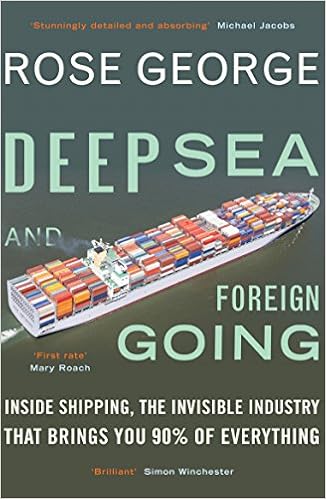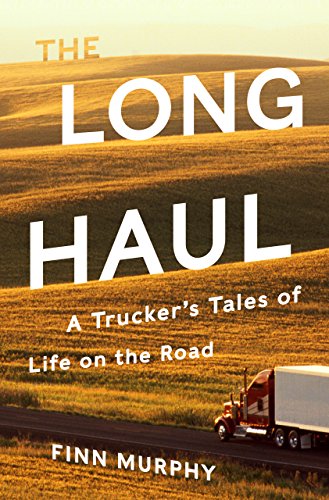Welcome to Shelf Care, where I review three books related by a theme. These aren’t necessarily the latest releases, but are hopefully books you can’t believe you missed.
“That’s the whole meaning of life isn’t it? Trying to find a place for your stuff.”
–George Carlin
This column’s theme: The Circle of Stuff – wherein we look at people who handle our stuff in when it’s out of our hands.
If you’ve spent parts of quarantine trying to Marie Kondo your home, you’ve inevitably looked at something that was taking up space around you and had to ask yourself the following questions
- Where did this come from?
- Why do I have this thing?
- How do I get rid of it?
And while you might not be aware of it, the answers to these questions almost certainly involve other people, so in this month’s Shelf Care we’ll be taking a closer look at those people – the people running the container ships that haul things across the oceans. A trucker that moves things around the country, and the recycling industry that puts stuff back on those container ships to be turned in to more stuff. So, let’s start taking care of some stuff with any of the following books.
So if you like:
Commercial Shipping
Living on a boat
Avoiding pirates
Travel shows, like Michael Palin’s Around the World in Eighty Days
You might like
Deep Sea and Foreign Going, by Rose George
Overview
Rose George boards a container ship from London to Singapore, and along the way delves into life on board, the history of shipping, pirates, economics and the environmental impact of these boats that bring us most of our stuff.
Sample passage
He doesn’t wonder about the boxes. They are things full of things, to be moved according to schedule. He doesn’t know what’s inside them and he doesn’t care. I know he drives a Harley-Davidson at home, so I needle him. What if there were a box full of Harleys? ‘Then there’s one full of Harleys. I’m used to the fact that there’s no way to get to see them anyway.’ It would take him days to read the full manifest of all the cargo on Kendal, and anyway there isn’t one on board. A modern container ship is crewed by people who have no idea what they are carrying.
Takeaway
If you’ve wondered about any, and I do mean any, aspect of commercial shipping, it’s probably explored here. Economic, political, environmental, social, historical, psychological, and probably a few other ‘al’s as well – it’s all here. What could have been a short bit about a trip on a container ship (and believe me it would have been short as things on a container ship don’t change much day to day) becomes an exploration of all things shipping. What are the crews like? Why has shore leave effectively become a thing of the past? What’s the environmental impact of all these boats? Why do sailors have little legal recourse if something goes wrong? What’s up with the Somali Pirates, and who negotiates with them? The point being, if you’re looking for a better understanding of how 90% of the world’s goods move, you’ll definitely find it here.
Or if you like:
Road trips that were apparently set up on a dare.
The economics and sociology of truckers.
Playing Container Tetris with everything in a house.
Knowing why you should never drive alongside an 18-wheeler.
You might like
The Long Haul: A Trucker’s Tales of Life on the Road, by Finn Murphy
Overview
Finn Murphy has spent 40 years on the road, moving people from one end of the United States to the other. His telling of how he started, how he does it, and some of his more memorable moves say a lot about how the trucking industry operates and how people are way too attached to their stuff.
Sample passage
Willie and I walked back to Callahan’s yard. He opened the trailer doors, laid down some pads for a bed, and told me to be at Callahan’s at 7 a.m. This guy had just worked forty-eight hours straight with an eighteen-hour day in front of him tomorrow. He’d eaten a meal no three people could have finished, drunk twelve beers, and, according to him, made over $3,000 in four days. He’d had no shower for who knows how long and was sleeping in his trailer.
I was intrigued.
Takeaway
This follows Murphy’s start in the moving industry and flows naturally into his occupation as a trucker. Along the way he explains bits of trucker subculture (apparently most other truckers hate movers), provides tips like ‘never drive alongside an 18-wheeler’ (if a front tire blows it’ll cut in front of you as the trailer pushes it forward) and shares what he’s learned from over 3000 moves (you’ve got too much unimportant stuff that you’re too attached to) in as well as describing some of his more interesting adventures on the road. Like a prank with Chinese gravestones, or that one time the guy training him was trying to kill him. It’s a fascinating slice of life that everybody will intersect with somewhere down the road, and well worth the read.
Or if you like:
Recycling more than reducing or reusing.
Knowing where that stuff in the bin is probably going.
Investigative journalism.
You might like
Junkyard Planet: Travels in the Billion-Dollar Trash Trade, by Adam Minter
Overview
Adam Minter delves in to where things go when they’re not wanted anymore.
Sample passage
“They have to train for a full month,” explains Tony. “They learn to tell the metal by how it feels and looks. They don’t make many mistakes.”
“Why are they all women?” I ask.
“Women are more precise and patient. Men aren’t good at this kind of work.”
There are 800 of them working at Sigma, but only—I’d guess—150 in this warehouse. I stand up and notice more teal-garbed women arriving with more yellow wheelbarrows full of more unsorted metal—beyond sufficient to replace what has just been sorted. It feels endless, the one time in my life that I can apply the adjective Sisyphean and not feel like I’m being melodramatic.
Tony tells me that he pays the sorters around $100 per month, plus room and board. It’s a good salary in 2002, and much better than what could be earned on the farms from which most of Sigma’s—and China’s—factory labor has migrated. What they do for that money doesn’t look like the sort of thing that I’d want to spend my time doing. Rather, it looks like factory work: tedious, boring, unfulfilling, the sort of work where you spend your time calculating how much extra you’ll make if you can manage to get another ten minutes on your punch card.
Tony seems to read my face. “You think they prefer to spend all day planting rice in the fields? At least at my place they only work eight hours and rest on the weekend.
“Really?”
“They work more than eight hours, and they get tired and don’t sort so good. If they don’t sort so good, my quality drops.”
Takeaway
Minter’s family owned a salvage yard, which gave him ample qualifications as a reporter whose beat is the global recycling industry. In Junkyard Planet, he travels the globe, covering the history of recycling in the US, along with the economics and human cost of dealing with things that aren’t wanted anymore. There’s some surprisingly promising technology shown next to the predictable ecological catastrophes, along with the mixed bag of awful jobs that are better than even worse jobs.
So, what other books should be on this list? Leave your thoughts in the comments, and stay tuned for my next column.








Leave a Reply